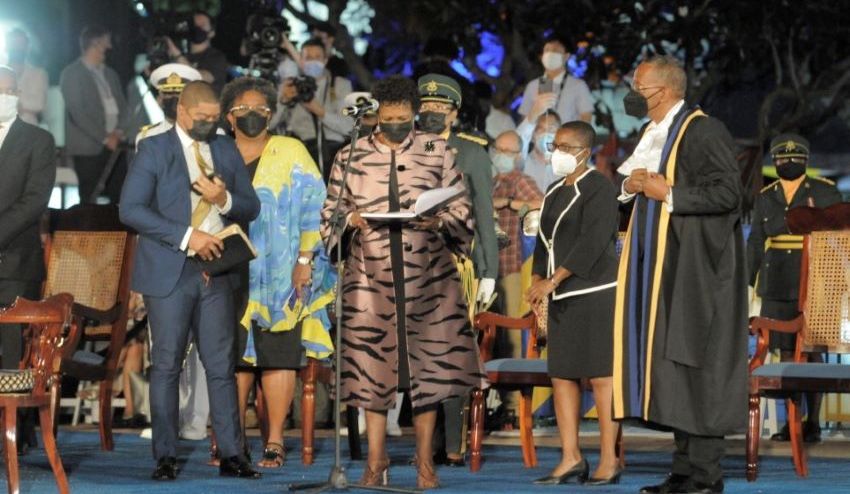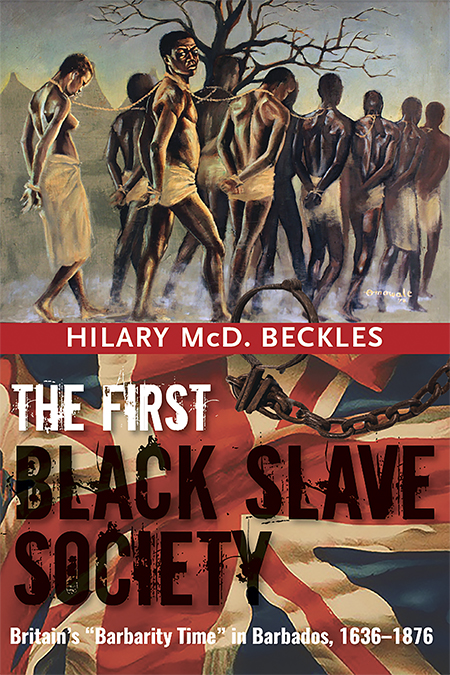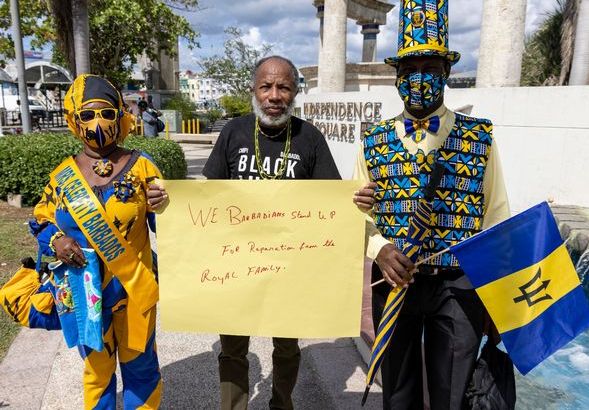Barbados Declares Itself a Republic
Yes! It Can Be Done!
 Ceremony swearing in Dame Sandra Mason as Barbados’ first President, November 29, 2021.
Ceremony swearing in Dame Sandra Mason as Barbados’ first President, November 29, 2021.
Today, November 30, Barbados became a Republic. The Republic of Barbados was declared at a ceremony late in the evening on November 29 at the National Heroes Square in the capital, Bridgetown, to coincide with the anniversary of Barbados’ formal independence from Britain, 55 years ago.
With this action, Barbados has become the fourth of Britain’s previous colonies in the Caribbean to become a republic, following Guyana, Trinidad and Tobago and Dominica which have had already taken this path forward.
On this day, the Queen of England ceases to be the head of state of Barbados; the word “royal” will be removed from the names of institutions and they will no longer bear the insignia of the British Queen; the new head of state is the newly-elected president, Dame Sandra Mason.
The Marxist-Leninist Party of Canada congratulates the people of Barbados for this achievement in their long ongoing fight to affirm their right to be and settle scores with the 400 years of colonial history which started with the seizure of the island by English slave-owners in 1627, the introduction of the brutal system of slavery to run sugar plantations, formal independence 55 years ago and now the declaration of their Republic. Still to be dealt with are the constitutional arrangements inherited from the British when formal independence was declared 55 years ago by Act of the British parliament itself.
The Transition
At the end of May, the government of Barbados announced that it had established a Republican Status Transition Advisory Committee (RSTAC), specified its terms of reference and gave it just over four weeks to produce a medium-term report and a final report by the end of September. This process was consistent with the current constitutional arrangements imposed on the island by the Barbados Independence Act and the Barbados Independence Order of 1966, both of which were passed in the British parliament. These legal instruments represent the legal basis on which the independence of the country rests. They reinforce the Westminster system which enshrines a political framework within which the dispossession and disempowerment of the majority is enforced. Under this system, the African descendant population was enslaved for 200 years followed by another 100 years of colonial ghettoization, impoverishment and marginalization. Despite the achievement of universal suffrage in 1951 as a result of the people’s struggle for empowerment, the constitutional and legal structure remains the one established to facilitate the control of Barbados by the neo-liberal financial oligarchy and their institutions and under tutelage of foreign powers, especially the U.S. imperialists and their allies. This is something the people’s movement for empowerment in the Caribbean and the movement for reparations is seriously contesting, defying and striving to put to rest.
 Vice-chancellor of the University of the West Indies, the Barbadian historian and chairman of the Caribbean Community (CARICOM) Reparations Commission, Professor Sir Hilary Beckles, said that the declaration of the Republic marks an historic moment for Barbados, the Caribbean and all post-colonial societies. “This is the end of the story of colonial exploitation of the mind and body,” he said. “The people of this island have struggled, not only for freedom and justice, but to remove themselves from the tyranny of imperial and colonial authority,” he added. He highlighted that Barbados was “Britain’s colonial site of the first ‘black slave society,’ the most systemically violent, brutal and racially inhumane society of modernity.”
Vice-chancellor of the University of the West Indies, the Barbadian historian and chairman of the Caribbean Community (CARICOM) Reparations Commission, Professor Sir Hilary Beckles, said that the declaration of the Republic marks an historic moment for Barbados, the Caribbean and all post-colonial societies. “This is the end of the story of colonial exploitation of the mind and body,” he said. “The people of this island have struggled, not only for freedom and justice, but to remove themselves from the tyranny of imperial and colonial authority,” he added. He highlighted that Barbados was “Britain’s colonial site of the first ‘black slave society,’ the most systemically violent, brutal and racially inhumane society of modernity.”
Between 1627 and 1833, it is estimated that 600,000 enslaved Africans were brutally and inhumanly transported to Barbados, being put to work in the sugar plantations, and earning fabulous ill-gotten fortunes for the English owners. This is a sizeable proportion of the more than 10 million human beings from Africa who, if they survived the brutal voyage, between the 15th and 19th centuries, ended up beaten and toiling on the plantations.
“Barbados under English colonial rule became the laboratory for plantation societies in the Caribbean,” said Richard Drayton, a professor of imperial and global history at King’s College, London, who lived in Barbados as a child. “It becomes the laboratory for slave society, which is then exported to Jamaica and the Carolinas and Georgia after that.”
Writing in Open Democracy, Barbados Today journalist Kareem Smith said: “Many of my fellow young Barbadians view November 30 as the start of a new national journey. In fact, many of us are not content with the simple tokenism of having a Barbadian head of state. Instead, we see the need to move on from a centuries-old order that vested tremendous power in a concept of hereditary sovereignty that was never consistent with our identity. As sovereign, the British monarch owns all state lands, buildings, equipment, state-owned companies, the copyright on government publications and employs all government staff.”
Lalu Hanuman, of the 13th June 1980 Movement, said: “A lot of people don’t realize the linkages between the Royal Family and slavery. Their hands are mired in it. And a substantial amount of their wealth came from it. Kensington Palace was directly built off of the slave trade by King William III. Before that Elizabeth I granted a royal charter to Sir John Hawkins and provided him with ships for the slave trade. She also gave him his own coat of arms, which depicted a chained African person.” An English ship claimed Barbados for King James I in 1625.

“We Barbadians stand up for reparations from the Royal Family.” |
Now, 55 years to the day since Barbados declared independence, its people have finally removed Queen Elizabeth II as head of state and proclaimed Barbados a republic. Demonstrations demanding an apology and reparations from the royals and the government of the “United Kingdom” met Prince Charles as he arrived in Barbados on November 29. Reparations owed run into hundreds of millions of pounds. The fight of the peoples of Barbados, the Caribbean, the United States and all of Africa and Asia for reparations from the damages caused by slavery is taking on new impetus.
Canadians have a lot of learn from the struggle of the people of Barbados for empowerment and the achievement of their Republic. Most of all, it shows that It Can Be Done! A former British colony can achieve not only independence but also break the bounds imposed by Acts of the British parliament. Such Acts impose the constitutional arrangements which are overseen and kept in force by the incorporated person of the monarch sitting on the English throne as head of state. Notwithstanding that the degenerate heir to the English Throne was present during the ceremonies declaring the new Republic of Barbados, this declaration is a timely move. The people of Barbados will not have to suffer the impositions which the medieval English Act of Succession demands once the current sitting monarch is replaced by another as if this is what their “subjects” want. It shows that attempts are in vain whereby the ruling class tells Canadians and Quebeckers that only under the “ancient” British institutions and constitutional arrangements, with the permission of the monarch sitting on the English Throne, can new arrangements be brought into being on the basis of self-serving prerogative powers.
An elected head of state is possible! It Can Be Done! It Must Be Done! Let the people decide and constitute Canada on a modern basis, as they see fit!


